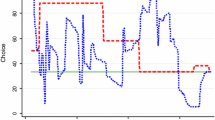Abstract
This paper models a contest where several sellers compete for a contract with a single buyer. There are several styles of possible designs with a subset of them preferred by the buyer. We examine what happens when the buyer communicates information about his preferences. If the sellers are unable to change their style, then there is no effect on the welfare of the sellers. If the sellers are able to make adjustments, extra information may either boost or damage the sellers’ profits. While the chance that there will be a proposal of a style preferred by the buyer cannot decrease, the buyer’s surplus may increase or decrease.
Similar content being viewed by others
References
Amann E., Leininger W.: Asymmetric All-pay auctions with incomplete information: the two-player case. Games Econ Behav 14(1), 1–18 (1966)
Bajari P., Tadelis S.: Incentives versus transaction cost: a theory of procurement contracts. Rand J Econ 32(3), 387–407 (2001)
Baye M., Kovenock D., de Vries C.: The all-pay auction with complete information. Econ Theory 8(2), 291–305 (1996)
Beaver P.: The Crystal Palace: 1851–1936, a Portrait of Victorian Enterprise. Hugh Evelyn Limited, London (1970)
Bergemann D., Pesendorfer M.: Information structures in optimal auctions. J Econ Theory 137(1), 580–609 (2007)
Bergemann D., Välimäki J.: Information acquisition and efficient mechanism design. Econometrica 70(3), 1007–1033 (2002)
Che Y.-K., Gale I.: Caps on political lobbying. Am Econ Rev 88(3), 643–651 (1998)
Cremer J., Khalil F.: Gathering information before signing a contract. Am Econ Rev 82(3), 566–578 (1992)
Eso P., Szentes B.: Optimal information disclosure in auctions. Rev Econ Stud 74(3), 705–731 (2007)
Ganuza J.-J.: Competition and cost overruns in procurement. J Ind Econ 55(4), 633–660 (2007)
Gershkov A.: Optimal auctions and information disclosure. Rev Econ Des 13(4), 335–344 (2009)
Hotelling H.: Stability in competition. Econ J 39(153), 41–57 (1929)
International Herald Tribune, Boeing: says it will file protest over tanker deal. 11 March 2008
Kaplan T.R.: Why banks should keep secrets. Econ Theory 27(2), 341–357 (2006)
Kaplan T.R., Luski I., Wettstein D.: Innovative activity and sunk costs. Int J Ind Organ 21(8), 1111–1133 (2003)
Kaplan T.R., Wettstein D.: Comment: caps on political lobbying. Am Econ Rev 96(4), 1351–1354 (2006)
Kaplan, T.R., Zamir, S.: The strategic use of seller information in private-value auctions. Center for Rationality, Hebrew University, Discussion Paper 221 (2000)
Laffont J.J., Tirole J.: A Theory of Incentives in Procurement and Regulation. MIT Press, Cambridge (1993)
Lee T.K.: Competition and information acquisition in first price auctions. Econ Lett 18(2–3), 129–132 (1985)
McAfee R.P., McMillan J.: Incentives in Government Contracting. University of Toronto Press, Toronto (1988)
Milgrom P.R., Weber R.J.: A theory of auctions and competitive bidding. Econometrica 50(5), 1089–1122 (1982)
New York Times: Caroline Brothers: Boeing and airbus prepare (again) for tanker battle, 17 June (2009)
Persico N.: Information acquisition in auctions. Econometrica 68(1), 135–148 (2000)
Salop S.C.: Monopolistic competition with outside goods. Bell J Econ 10(1), 141–156 (1979)
Service A.: The Architects of London and Their Buildings from 1066 to the Present Day. The Architectural Press, London (1979)
Tullock G.: Efficient Rent-Seeking. In: Buchanan, J.M., Tollison, R.D., Tullock, G. (eds) Towards a Theory of Rent-Seeking Society, pp. 269–282. Texas A&M Press, College Station (1980)
Author information
Authors and Affiliations
Corresponding author
Additional information
I wish to thank Martin Beckman, Dan Kovenock, John Maloney, Amnon Shalom an anonymous referee, and seminar participants at the CESifo Venice Summer Institute on Advances in the Theory of Contests and its Applications for useful comments.
Rights and permissions
About this article
Cite this article
Kaplan, T.R. Communication of preferences in contests for contracts. Econ Theory 51, 487–503 (2012). https://doi.org/10.1007/s00199-010-0525-2
Received:
Accepted:
Published:
Issue Date:
DOI: https://doi.org/10.1007/s00199-010-0525-2




